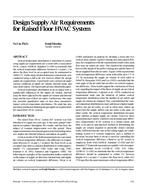A study was conducted to examine the total equivalent warming impacts (TEWI) of unitary residential and commercial space conditioning equipment in North America, Europe, and Japan using refrigerants R-407C, R-410A, and R-290 and alternative heating/cooling technologies. Assumptions and results of this study are presented for U.S. residential applications. Alternative systems are compared with the TEWI of conventional R-22 based vapor compression systems under the same operating conditions. The analysis for North America includes low- and medium-efficiency electric heat pumps and high-efficiency air-to-air and geothermal heat pumps. Alternative space conditioning technologies, such as electric resistance heat, a gas furnace/central air conditioner combination, a gas engine-driven heat pump, and a prototype gas-fired absorption heat pump, are included for residential TEWI comparisons in three U.S. cities with a range of heating and cooling loads. The effects of improving seasonal efficiencies on TEWI are shown, as well as the consequences of replacing R-22 with alternative refrigerants.
Units: Dual
Citation: Symposium, ASHRAE Transactions, vol. 105, pt. 1
Product Details
- Published:
- 1999
- Number of Pages:
- 10
- File Size:
- 1 file , 470 KB
- Product Code(s):
- D-7634


